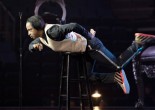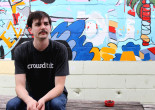
Stand Up and Deliver: Get Good & Get Out
Photo by Jaromy Barber
In the world of stand-up comedy, when you record an album, that material is done, put on the shelf: never to be done again. It’s called “burning” the material, in that it you have to start up a whole new set and put a massive amount of time into doing so. For many comics, having a good solid 30 minutes is a feat-for Theo Taylor, it’s a fraction. For a guy who’s been doing stand-up here for 14 years, it’s time to follow his own advice and move on. It may sound crazy, but the two hours worth of material Taylor has amassed might get burned sooner than later, with a move to a whole new city. Free Press Houston had the chance to catch up with him before he says his goodbyes and leaves Houston in his epic comedic wake.
FPH: Where are you from?
TT: Houston. Well, I was born in Liberia, I moved to D.C. around the age of two, but I’ve been here since the fifth grade.
FPH: How long have you been doing stand up?
TT: Fourteen years. I started when I was 18 at The Laff Stop on Grey. I wouldn’t be funny if it wasn’t for that place. It was a different time. I started back when you could still smoke in the club, so I’d have to make out the audience through a haze of smoke. Sometimes I’d get paid in cocaine. But I wouldn’t be funny without going through all of that.
FPH: Is it true that you’re also a singer and a dancer as well?
TT: Yeah, I took ballet lessons at age eight and I was in choir for years. I was in theater for a long time, but I quit all of that to focus on stand-up.
FPH: Why stand-up comedy?
TT: Because in stand-up, the success you have or the failures are all on you. My friend took me to The Stop when I was 18, and they asked me to come back. But I never left that front room for two years. It wasn’t until I saw good comics and bad comics, and when I figured out what a real comic was, that I realized that I didn’t belong in the back room with the better comics. I had left theater because I liked the honesty of stand-up. You aren’t reading someone else’s words or acting out their emotions-it’s all you. You can surround yourself with people who say you’re funny, but when you’re on stage and you aren’t getting laughs, the proof is there.
FPH: I had read somewhere that you have said before, that as a comic you “gotta’ get out,” in reference to leaving town. Do you still feel that way, and how often do you get out?
TT: Well, I am getting out, either at the end of this year or early next year. I actually feel like I’ve stayed here too long. We tend to push industry out in Houston. You’ve gotta’ get good and then get out for your career to go to the next level. Think about it. Kennison, Harrison Whittles, Bill Hicks: they all had to go somewhere else to get big after their time in Houston. Houston is a great breeding ground for comics, but the goal is to leave here and be good somewhere else.
FPH: You seem to have a very relatable and everyday act. Is it true that you write none of your stuff down?
TT: Yeah, it’s a shitty way to go about it, and I don’t recommend it for everyone, but I don’t write the material down. My jokes have a melody to them, where one word bleeds into the next. I’ll write the joke’s name down for reference, but that’s it. It comes from having a speech and debate background. Looking people in the eyes and just attempting to make the room smaller. Like when it’s you and your friends joking around, it’s just you and them. So, I just try to achieve that when I’m on stage and just make it like when I’m with my friends and just memorize everything. I’ll memorize when I’m walking down the street or washing dishes to where it’s second nature.
FPH: After all of this time doing stand up, isn’t it time for an album?
TT: I was gonna do one, but I killed all of my old material off. I have over two hours worth of stuff. I have talked to Dusti about recording something at Rudz, but I’ll be burning it all if I do that.
FPH: Do you feel like there’s a difference between the traditional rooms and these newer alternative rooms?
TT: Yeah, they are different, but all rooms are different. I’m against constantly doing the same room to the same people. But the traditional comedy rooms are the mecca-we’re built for that. The goal is to get paid for doing comedy in the traditional rooms. It doesn’t make sense to not play the traditional rooms. That’s like being a barber but saying, “I’m an alternative barber. I don’t cut hair in a barber shop.”
FPH: Who’s your favorite comedian of the past and of the present?
TT: Lucille Ball, Bill Cosby, and Dave Chapelle from the past. Presently Tom Segura, John Mulaney, Jim Jeffries, DeRay Davis and Lil’ Rel.
FPH: What’s been the biggest show you’ve done so far?
TT: The biggest audience size was six thousand for a banquet once. My favorite was doing a show with Carlo Francisco. It was like one big party and a total blast.
Taylor says that he doesn’t really plan his shows too far in advance. You can usually catch him opening for a good percentage of the heavy hitters who roll into the traditional clubs. A regular at the Improv, Taylor can be found in various spots on the web, and is easily worth catching before he gets out of Houston, because he’s already good.




You must be logged in to post a comment Login